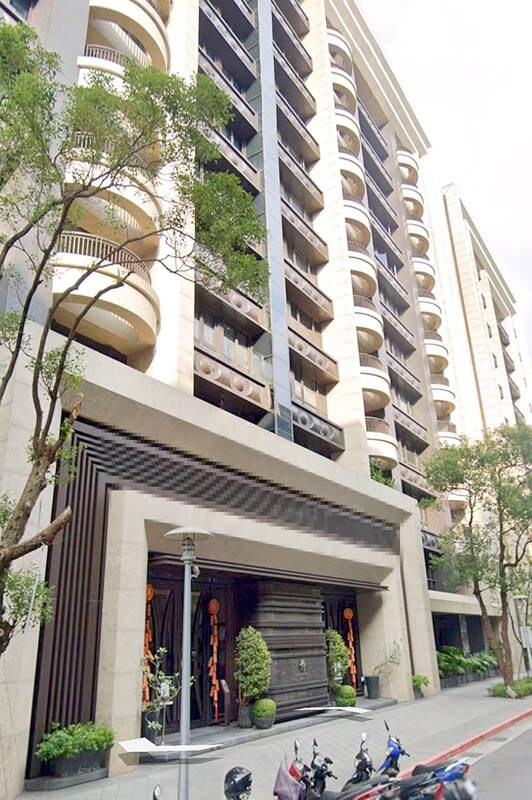Police said an investigation into the deaths of a man and a woman at a Taipei luxury residence found illegal substances in the room, such as mephedrone, ketamine and nimetazepam, as well as one vaping device, and the cause of death was likely drug overdose.
The case received significant media attention, as the deaths happened in a high-end residential complex in an upscale area and the deceased were young.
The man, who owned the unit and managed a venture capital company that invests in tech start-ups, was in his 30s, while the woman was 25, police said.

Photo: Screen grab from Google Maps
The father of the man, surnamed Chen (陳), said that after he could not reach his son on Saturday, he went to his home to look for him.
As he had a key to the residence, he went in and found his son and the woman, surnamed Tseng (曾), next to each other in front of the sofa in the living room, he said, adding that he then called an ambulance and the police.
When medics arrived, they found that the couple had no vital signs, and they were declared dead at a hospital.
Evidence at the scene showed no signs of a third party nor foul play, police said, adding that the building’s surveillance system showed no other person had entered the unit after Chen and Tseng came home on Friday, and that they did not go outside again.
Police said they found an unknown white powder and other materials on the table, as well as a vaping device, so they suspect that the couple had been consuming narcotics, which led to an overdose.
Initial test results from the police’s forensic science center yesterday confirmed that the white powder contained several substances classified as illegal narcotics in Taiwan, they said.
The powder included mephedrone, also known as Meow Meow (喵喵), a synthetic stimulant related to amphetamine, as well as nimetazepam, a hypnotic drug popular at parties, police said, adding that the vape pod allegedly contained cannabis.
Family members of the deceased agreed to an autopsy, which would be performed in the next few days, so that forensic doctors can determine the exact cause of death, police investigators said.

Trips for more than 100,000 international and domestic air travelers could be disrupted as China launches a military exercise around Taiwan today, Taiwan’s Civil Aviation Administration (CAA) said yesterday. The exercise could affect nearly 900 flights scheduled to enter the Taipei Flight Information Region (FIR) during the exercise window, it added. A notice issued by the Chinese Civil Aviation Administration showed there would be seven temporary zones around the Taiwan Strait which would be used for live-fire exercises, lasting from 8am to 6pm today. All aircraft are prohibited from entering during exercise, it says. Taipei FIR has 14 international air routes and

Taiwan lacks effective and cost-efficient armaments to intercept rockets, making the planned “T-Dome” interception system necessary, two experts said on Tuesday. The concerns were raised after China’s military fired two waves of rockets during live-fire drills around Taiwan on Tuesday, part of two-day exercises code-named “Justice Mission 2025.” The first wave involved 17 rockets launched at 9am from Pingtan in China’s Fujian Province, according to Lieutenant General Hsieh Jih-sheng (謝日升) of the Office of the Deputy Chief of the General Staff for Intelligence at the Ministry of National Defense. Those rockets landed 70 nautical miles (129.6km) northeast of Keelung without flying over Taiwan,

The Ministry of National Defense (MND) today released images of the military tracking China’s People's Liberation Army (PLA) movements during the latest round of Chinese drills around Taiwan. The PLA began "Justice Mission 2025" drills today, carrying out live-fire drills, simulated strikes on land and maritime targets, and exercises to blockade the nation's main ports. The exercises are to continue tomorrow, with the PLA announcing sea and air space restrictions for five zones around Taiwan for 10 hours starting from 8:30am. The ministry today released images showing a Chinese J-16 fighter jet tracked by a F-16V Block 20 jet and the

City buses in Taipei and New Taipei City, as well as the Taipei MRT, would on Saturday begin accepting QR code payments from five electronic payment providers, the Taipei Department of Transportation said yesterday. The new option would allow passengers to use the “transportation QR code” feature from EasyWallet, iPass Money, iCash Pay, Jkopay or PXPay Plus. Passengers should open their preferred electronic payment app, select the “transportation code” — not the regular payment code — unlock it, and scan the code at ticket readers or gates, General Planning Division Director-General Liu Kuo-chu (劉國著) said. People should move through the